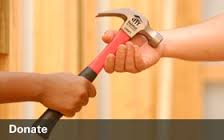Every day, more and more families find themselves in a struggle to keep a decent roof over their heads.
Caught in punishing cycles of unpredictable rent increases, overcrowded conditions, or lack of access to land and affordable financing, these families live with a constant burden of uncertainty, stress and fear.
Habitat for Humanity knows that safe, decent and affordable shelter plays an absolutely critical role in helping families to create a new cycle, one filled with possibilities and progress. Affordable homeownership frees families and fosters the skills and confidence they need to invest in themselves and their communities. The outcomes can be long-lasting and life-changing.
With a little help, Habitat homeowners are able to achieve the strength and self-reliance they need to build better lives for themselves and their families. They are empowered to overcome the barriers that so often stand between their families and better, healthier, more financially stable lives.
Studies conducted by academics and experts draw a straight line between housing quality and the well-being of children. Surveys of Habitat homeowners show improved grades, better financial health, parents who are more sure that they can meet their family’s needs. Wherever we work, we witness tangible evidence that strong and stable homes help build strong and stable communities.
Decent shelter provides the solid foundation for all of this. It’s the platform on which a family lives out today’s realities and prepares for tomorrow’s transformations. Every Habitat house changes lives: those of the families who help build them and pay an affordable mortgage or loan and all those who offer them a hand up in a time of need.










